
Cuadernos de Bioetica
Scope & Guideline
Empowering Ethical Decision-Making in Medicine
Introduction
Aims and Scopes
- Bioethical Issues in Healthcare:
The journal focuses on a wide range of bioethical issues arising from healthcare practices, including topics such as euthanasia, informed consent, and the ethical implications of medical technologies. - Interdisciplinary Approaches to Bioethics:
It encourages contributions that draw on various disciplines, including philosophy, law, and social science, to provide comprehensive analyses of bioethical dilemmas. - Rights and Vulnerability:
There is a consistent emphasis on the rights of individuals, particularly in vulnerable populations, and the ethical considerations surrounding their care and autonomy. - Impact of Emerging Technologies:
The journal explores the ethical challenges posed by advancements in biotechnology and technoscience, such as transhumanism and digital health applications. - Cultural and Historical Perspectives:
It examines bioethical issues through the lens of cultural, historical, and societal contexts, reflecting on how these factors influence ethical standards and practices.
Trending and Emerging
- Digital Health and Ethics:
There is a growing focus on the ethical implications of digital health technologies, including mental health applications and online pornography, as they become increasingly integrated into healthcare. - Transhumanism and Human Enhancement:
This theme has gained momentum as discussions around transhumanism and human enhancement technologies expand, exploring the ethical ramifications of altering human capabilities. - Vulnerability and Rights in Healthcare:
A rising emphasis on the concepts of vulnerability and the rights of individuals in healthcare settings, particularly concerning marginalized populations, reflects a deeper engagement with social justice issues. - Bioethics in the Context of COVID-19:
The pandemic has catalyzed a surge in discussions about bioethical issues related to public health, such as vaccine distribution, health equity, and the ethical considerations of lockdown measures. - Interdisciplinary Collaboration:
The journal is increasingly fostering interdisciplinary collaboration, inviting contributions that bridge bioethics with fields such as sociology, psychology, and technology studies, thereby enriching the discourse.
Declining or Waning
- Traditional Medical Ethics:
There has been a noticeable decrease in publications focused solely on traditional medical ethics, such as basic principles like autonomy, beneficence, non-maleficence, and justice, indicating a possible shift towards more contemporary ethical dilemmas. - Historical Perspectives on Bioethics:
Papers specifically addressing historical perspectives on bioethics, while still relevant, have become less frequent, suggesting a movement towards current and future-oriented discussions rather than retrospectives. - Legal Case Studies in Bioethics:
The frequency of articles centered on legal case studies or specific legal frameworks surrounding bioethics has diminished, possibly indicating a transition to broader theoretical discussions or ethical frameworks.
Similar Journals
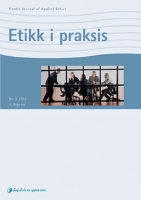
Etikk i Praksis
Fostering Innovative Perspectives in EthicsEtikk i Praksis is an influential peer-reviewed journal dedicated to advancing the discourse surrounding ethical practices and philosophical inquiry. Published by Akademika AS under the esteemed Akademika Forlag banner, this journal has been a vital resource in the field of ethics since its transition to Open Access in 2007, ensuring that cutting-edge research is accessible to all. Based in Norway, the journal has carved a niche within the philosophy discipline, currently holding a Q3 quartile ranking, with a commendable position of #352 out of 806 in the Scopus Arts and Humanities - Philosophy rankings. Its convergence years extend from 2011 to 2024, positioning it as a continually relevant platform for scholarly contributions. With an emphasis on practical applications of ethical theory, Etikk i Praksis serves as an essential journal for researchers, professionals, and students aiming to deepen their understanding and explore contemporary ethical challenges.
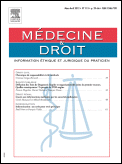
Medecine & Droit
Transforming Medical Practice Through Legal PerspectivesMedecine & Droit, an esteemed journal published by ELSEVIER MASSON, CORP OFF, serves as a vital resource for the intersection of law and medicine. Since its inception in 1995, this journal has facilitated scholarly discourse by publishing innovative research, case studies, and reviews that explore the complexities of legal frameworks impacting medical practice and public health. Although currently classified in the fourth quartile within both the Law and Medicine (miscellaneous) categories for 2023, its contributions are important for legal professionals and healthcare providers seeking to navigate the evolving landscape of medical laws. With an ISSN of 1246-7391 and E-ISSN 1873-6475, it provides essential insights and stimulates interdisciplinary collaboration within academia. Authors and researchers are encouraged to contribute and engage with critical topics shaping the future of medicine and law through this essential publication.

THEORETICAL MEDICINE AND BIOETHICS
Unraveling Ethical Challenges in Modern Healthcare.THEORETICAL MEDICINE AND BIOETHICS, published by SPRINGER, is an esteemed journal dedicated to exploring the complex intersections of medicine, ethics, and law. With its ISSN 1386-7415 and E-ISSN 1573-1200, this journal serves as a vital platform for scholars, practitioners, and students interested in the ethical implications of medical practices and innovations. Although it currently holds a Q4 impact factor in the categories of Issues, Ethics and Legal Aspects and Medicine (Miscellaneous) as of 2023, its relevance is amplified by its commitment to fostering critical discourse in a rapidly evolving field. The journal features a diverse range of articles that address profound ethical dilemmas in healthcare, making it a significant resource for contemporary research from 1997 to the present. As an open-access journal, it ensures that cutting-edge knowledge is readily available, inviting contributions that challenge conventional thought and advance the field of bioethics.
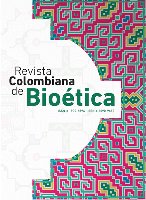
Revista Colombiana de Bioetica
Inspiring Critical Thinking in BioethicsRevista Colombiana de Bioetica, an esteemed publication under the auspices of UNIV EL BOSQUE, serves as a pivotal platform in the interdisciplinary field of bioethics, offering insights and scholarly discourse relevant to researchers, professionals, and students alike. With an ISSN of 1900-6896 and an E-ISSN of 2590-9452, this open access journal, available since 2010, champions the democratization of knowledge, ensuring that vital research is accessible to all. Nestled in Bogotá, Colombia, the journal's commitment to ethical inquiry and critical thinking in biomedical and health-related disciplines positions it as a crucial resource for those keen on exploring the intersections of ethics, law, philosophy, and health sciences. By facilitating the exchange of innovative ideas and research, the Revista Colombiana de Bioetica aspires to inspire informed dialogue and foster ethical practices within the scientific community and beyond.

Ethik in der Medizin
Bridging Disciplines in Health Ethics InquiryEthik in der Medizin, published by Springer, is a distinguished journal focusing on the interdisciplinary aspects of ethics in medicine, healthcare policy, and philosophical inquiries related to these domains. With an ISSN of 0935-7335 and an E-ISSN of 1437-1618, this journal serves as a platform for innovative research and discussion from Germany and beyond. The journal boasts an impact in several prestigious categories including Q3 in Health Policy and Q2 in Philosophy as of 2023, reflecting its significant contribution to the discourse on ethical implications in health and medicine. Although not currently Open Access, Ethik in der Medizin provides valuable insights for researchers, professionals, and students interested in the complexities of health ethics and policies, positioning itself as an essential resource in academia. The journal is undergoing important developments, as it converges from 2001 with a publishing timeline extending to 2024, ensuring continued relevance in a rapidly evolving field.

International Journal of Feminist Approaches To Bioethics
Innovating ethical discussions with feminist theory at the forefront.International Journal of Feminist Approaches To Bioethics, published by University of Toronto Press Inc., is a leading interdisciplinary journal dedicated to advancing the discourse on bioethics through the lens of feminist theory. Since its inception in 2012, the journal has significantly contributed to the fields of Gender Studies, Health (social science), and Philosophy, earning commendable rankings in Scopus—particularly within the realms of Arts and Humanities and Social Sciences. The journal is recognized for its rigorous peer-review process and its focus on critical, intersectional analyses, making it an essential resource for researchers, professionals, and students interested in the ethical implications of biomedical practices and policies. Although currently not an open-access publication, it offers valuable insights that challenge traditional bioethical paradigms and encourages innovative scholarship. With a dynamic scope that continues to evolve until 2024, the journal remains vital for those striving to understand the complex interplay between gender and bioethical issues.
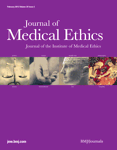
JOURNAL OF MEDICAL ETHICS
Exploring the Intersection of Ethics and HealthJOURNAL OF MEDICAL ETHICS, published by the esteemed BMJ PUBLISHING GROUP, is a leading journal that has been pivotal in advancing the discourse on ethical issues in healthcare since its inception in 1975. This UK-based journal, with an ISSN of 0306-6800 and an E-ISSN of 1473-4257, is well-regarded for its high-quality, peer-reviewed articles that delve into the complex moral dimensions surrounding medical practices, health policies, and social sciences. With a commendable impact, JOURNAL OF MEDICAL ETHICS has achieved Q1 quartile rankings across multiple categories, including Arts and Humanities and Health Policy in 2023, reflecting its significant influence and relevance in the field—ranked #23 of 552 in Arts and Humanities (Miscellaneous) with a 95th percentile, and #26 in Health Policy with a 91st percentile. Researchers, professionals, and students alike can benefit from the journal's commitment to fostering a deeper understanding of ethical considerations vital to the medical community, although it currently does not offer open access options. The journal's comprehensive examination of issues, ethics, and legal aspects continues to make it an essential resource for those dedicated to shaping the ethical landscape of healthcare.
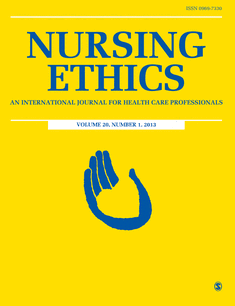
NURSING ETHICS
Championing Integrity in Nursing PracticeNURSING ETHICS, published by SAGE PUBLICATIONS LTD, is a premier international journal dedicated to the exploration and examination of ethical issues within the field of nursing. Since its inception in 1994, the journal has consistently provided a critical platform for scholars and practitioners to discuss ethical dilemmas and address complex legal aspects affecting nursing practice. With a remarkable Q1 ranking in the categories of Issues, Ethics, and Legal Aspects, it ranks in the top percentile, boasting a 92nd percentile position among its peers. Although currently not an Open Access journal, NURSING ETHICS plays a crucial role in fostering dialogue and advancing knowledge in the rapidly evolving landscape of nursing ethics, making it an invaluable resource for researchers, professionals, and students alike. The journal's commitment to high-quality research ensures that vital ethical considerations remain at the forefront of nursing education and practice, reinforcing its significance in a field that is continually impacted by ethical challenges.
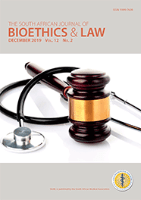
South African Journal of Bioethics and Law
Navigating the complexities of healthcare ethics and law.South African Journal of Bioethics and Law, published by HEALTH & MEDICAL PUBLISHING GROUP, stands as a vital academic platform for discussions at the intersection of bioethics and legal studies. With an ISSN of 1999-7639, this journal has embraced an Open Access model since 2008, ensuring global accessibility for researchers, practitioners, and students alike. Based in South Africa, the journal operates from PRIVATE BAG X1, PINELANDS, CAPE TOWN 7430, and features diverse articles that span a multitude of pertinent topics across health professions, law, and public health. It proudly holds a Q3 ranking in Health Professions and Law sectors, affirming its status within the scholarly community. Notably, for the year 2023, it has achieved impressive placements in Scopus ranks, reinforcing its commitment to disseminating high-quality research and fostering dialogues that influence policy and practice in these critical domains. Researchers exploring the intricate ethical and legal dimensions of healthcare will find this journal an indispensable resource.

Canadian Journal of Bioethics-Revue Canadienne de Bioethique
Illuminating pressing ethical challenges in healthcare.Canadian Journal of Bioethics-Revue Canadienne de Bioethique, published by the Universite de Montreal, is a premier open-access journal dedicated to advancing the multidisciplinary field of bioethics since 2012. Emphasizing the complexities of ethical practices in health policy, it serves as a vital resource for researchers, professionals, and students engaged in health and philosophy. With its E-ISSN 2561-4665, the journal's content is freely accessible, fostering knowledge dissemination and academic collaboration. Although categorized in Q4 among Health Policy and Health (social science) in 2023, it holds a respectable Q2 status in Philosophy, reflecting its strong theoretical contributions. Covering a wide scope from 2018 to 2024, the journal encourages robust discourse on pressing ethical issues facing contemporary healthcare systems. For those seeking to connect with the evolving narratives in bioethics, this journal is indispensable.